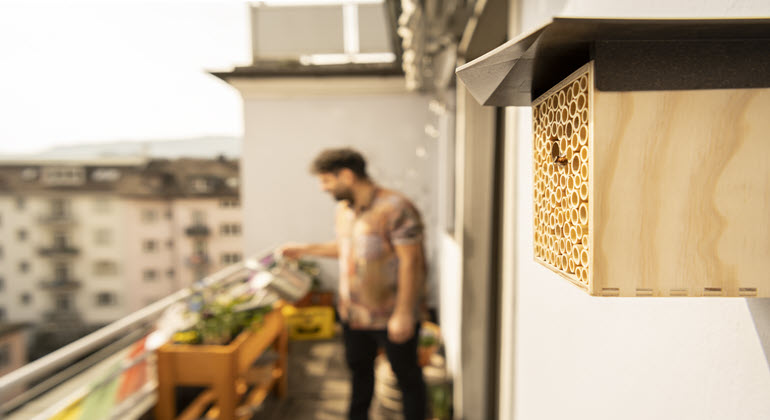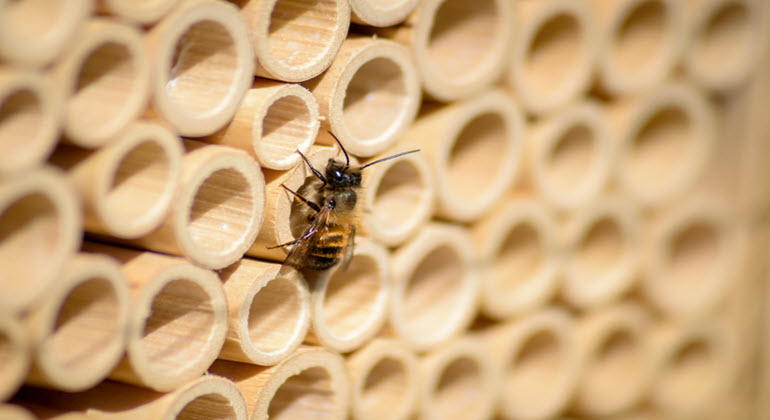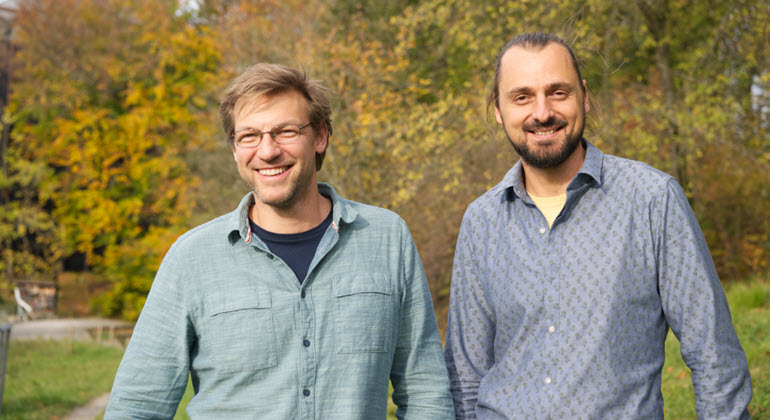Bees and other insects play a key role in our eco-system. Bee hotels can be used to entice the busy helpers into cities, as there are sufficient flowers to pollinate there too. The ‘hotels’ consist of wooden boxes filled with tubes, where mason bees in particular like to make their nests. This species of wild bee is 300 times as efficient at pollinating flowers as honey bees. It is considered to be harmless and unproblematic, and it doesn’t sting. This means that bee hotels can be set up on the balconies of city apartments, as well as in districts with single-family houses and on allotments.
For IP professionals
This is the portal for professionals working in the field of intellectual property. Here you'll find direct access to all necessary resources.
Quick links
Design protection for bee hotels
Terraces and meadows are alive with buzzing again: wild bees are out and about. This means that bee hotels are once again in use. We talked to an SME in Zurich that manufactures these products. As well as providing protection for wild bees, the company also relies on protection itself for its trade mark and designs.

The student party was alive with buzzing
Claudio Sedivy and Tom Strobl recognised the potential of bee hotels early on. They decided to found the company Wildbiene + Partner in the middle of the night at a student party. Today, the SME has around 25 employees. Last year, it had a stand at the Swiss Innovation Forum (SIF).
The company’s aims are close to the founders’ hearts. Claudio Sedivy studied biology at ETH Zurich and was awarded a doctorate in 2012. The subject of his thesis was wild bees. “I wanted to know just how important these insects are for plants. While working on my thesis, I discovered the impressive pollination achievements of mason bees on fruit farms,” says Claudio Sedivy.
Wild bee hotels are part of a strategy for a future with wild bees. The SME is helping to preserve these pollinating insects in Switzerland by combining sound education with active, targeted efforts to propagate wild bees and by creating appropriate habitats.

Clarifying intellectual property questions
Intellectual property questions arose soon after they launched the company. In a competition for start-ups, the founders won coaching sessions, which introduced them to IP rights step by step. “Registering the trade mark was easy. We didn’t need any support other than the coaching sessions we attended,” recalls Tom Strobl. Now that the trade mark has been registered with the IPI, it is valid for ten years. The company can renew the term of protection as many times as it wants.

Design protection will be renewed
They then decided to add a second IP right: design. “It was clear to us that we didn’t really have much chance of protecting our product with a patent. So we knew that we’d have to go with design protection,” says Tom Strobl. The SME thus applied to protect the form of the bee hotel, and the founders fully intend to renew this protection from imitators. The maximum term of protection is 25 years. They’ll probably submit additional bee hotel designs at some point. But for the time being, they’re keeping their cards close to their chest.
Trade mark:
Wildbiene + Partner https://www.swissreg.ch/srclient/en/tm/673153
Design protection:
Bee nest box https://www.swissreg.ch/srclient/en/des/142214
Bee nest aids https://www.swissreg.ch/srclient/en/des/142289



![[Translate to English:] [Translate to English:]](/fileadmin/_processed_/7/7/csm_schutzstrategie_gluehbirne_770x420_17f7c44e4a.jpg)
